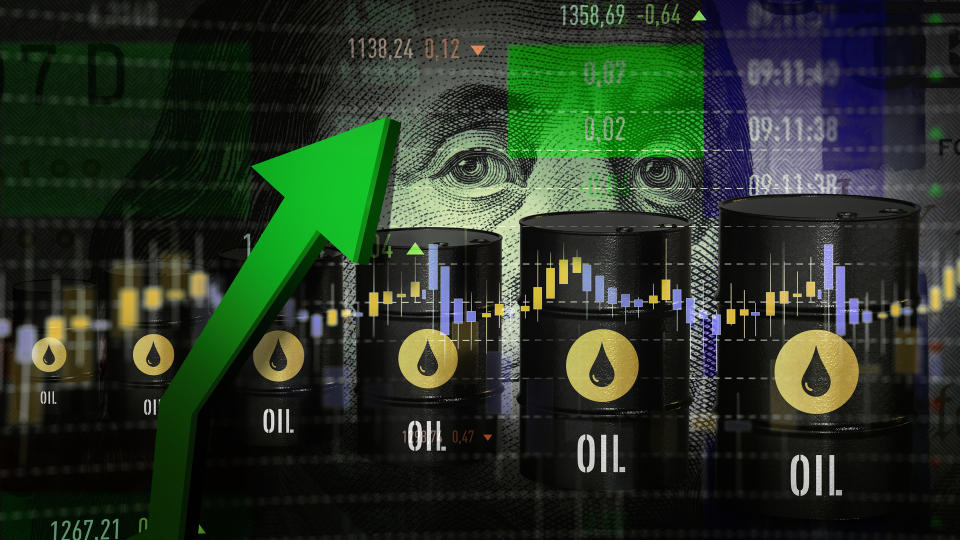Oil Companies Are Seeing Record Profits — Here’s Why

Gas prices are already sky high – averaging $3.804 per gallon according to AAA as of November 7 – but they could go even higher now that OPEC+ decided to reduce oil production by 2 million barrels a day in a bid to hike up oil prices amid stalling global economic growth.
Inflation Relief Checks: How To Get Your Payment for November
Stimulus Checks: 63% of Americans Support the Federal Government Sending More Inflation Relief
Amid the strain, which is largely driven by the Russia-Ukraine war, consumers are hurting. Oil companies, however, aren’t suffering one bit; in fact, they’re seeing major paydays.
Here’s a look at three of the biggest oil corporations and how they’re profiting right now:
Exxon: Grew earnings to $19.7 billion and $24.4 billion in Q3 2022. Shares rose 3% to $110.70, a record high, according to Reuters.
Chevron: Grew earnings to $11.2 billion in Q3 2022, compared with $6.1 billion the previous year.
Shell: Grew earnings to $9.45 billion for Q3 2022, compared with $4.13 billion from the same period in 2021.
Why are these oil corporations making so much money?
Huge Profits Are Part Of Oil Companies’ Business Model
“There are a couple of reasons why the oil companies are making a killing,” said Irina Tsukerman, Esq, a geopolitical analyst, a member of the American Bar Association’s Oil and Gas Committee and the president of Scarab Rising Inc. “First, energy companies are considered a ‘means of production.’ They are free enterprise, and like any other commodity in the U.S they are not controlled by the government, nor can the government regulate prices.”
“In fact, in the event of tax hikes either on the product itself or on the companies, the companies can pass off the losses to the consumer, as what companies typically do during inflation with any other product. And private companies are structured around making profit for themselves and their shareholders,” she continued.
Not only are oil companies entitled to make profits no matter the suffering of the consumers they serve, but they’re also somewhat obligated to do so.
“Private enterprises are in fact obligated by their fiduciary responsibility to maximize profits,” Tsukerman said. “In fact, even ‘socially responsible’ businesses (of which fossil fuels were never considered a type) are actually making profits and benefiting financially in various ways whether through tax write-offs or by attracting a new consumer base.”
Tsukerman added that “unlike public health or other such national emergencies or during a time of war when the government can commandeer any business to redirect themselves to producing a particular product for national benefit, such as masks, ventilators, or military equipment (and which is done very rarely for a business), inflation – often resulting from the government’s own policies – is not a circumstance where the government can pressure or force companies to produce anything much less change prices and its business model. In fact, that is considered undue interference and is inappropriate, bordering on illegal.”
And then there’s the fact of scarcity of supply, which Tsukerman says makes a difference “because when demand rises so do the prices, because consumers are willing to pay more for the same product.”
Unless Inflation Is Considered A National Emergency, High Prices Aren’t Going Anywhere
No matter how bad inflation gets, it’s unlikely that oil companies will soften prices.
“Whether and to what extent inflation can be considered a national emergency where companies should be acting in anything but their self-interest is a question for debate, but arguably 40 years ago when the inflation was around the same level across the country, it still was not considered an emergency and government relief to the public did not come via pressure on energy or other companies to stop benefiting from the rise in prices,” Tsukerman said. “The entire U.S market system is built on self-interest.”
Take Our Poll: Do You Believe in Quiet Quitting?
How then, will prices lower?
“The best way to lower prices for the consumers is to increase supply, so then the prices then fall,” Tsukerman said. “And there is less demand, which not only leads to a natural fall in prices but the companies actually lower the prices further to attract consumers.”
More From GOBankingRates
This article originally appeared on GOBankingRates.com: Oil Companies Are Seeing Record Profits — Here’s Why

 generic
generic 